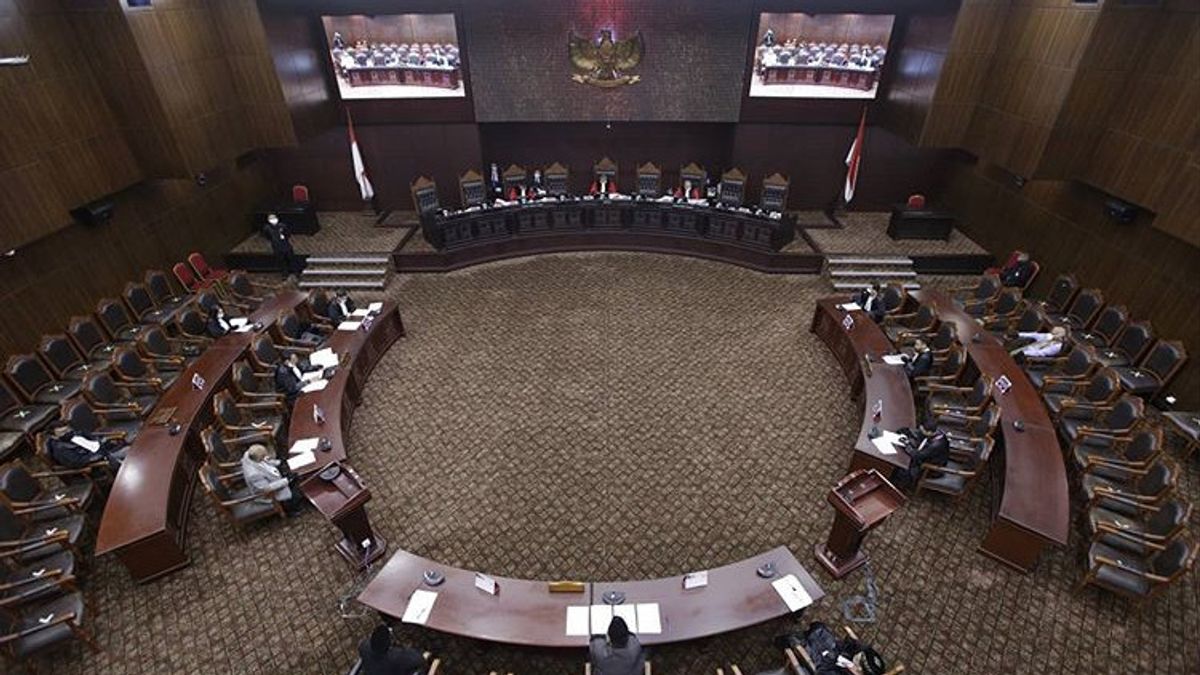JAKARTA - The revision of the Constitutional Court Law this year is considered to weaken the authority of the Constitutional Court decision and remove the obligation of the government and the DPR to comply with its decision.
This has resulted in a number of pessimists being able to cancel the Job Creation Law through the constitution, namely the application for judicial review (JR) Omnibus Law at the Constitutional Court.
However, according to the observer of constitutional law, Said Salahuddin, the abolition of article 59 paragraph (2) in the revision of the Constitutional Court Law has actually been deleted or canceled since nine years ago through the Constitutional Court Decision Number 49 / PUU-IX / 2011
"Please note, the provisions of Article 59 paragraph (2) of Law 8/2011 have been canceled by the Constitutional Court since nine years ago through Decision Number 49 / PUU-IX / 2011, dated October 18, 2011. So, Article 59 paragraph ( 2) it was deleted in Law 7/2020, "Said Said when confirmed by VOI , Wednesday, October 14.
Said said, the elimination of the article did not affect the nature of the Constitutional Court Decision which had the final and binding legal force ( final and binding ).
"The abolition of Article 59 paragraph (2) also does not cause the Constitutional Court Decision to be overridden by the DPR and the President, because in judicial review the position of the Constitutional Court Decision is also equated with law," said Said.
"So, even though Article 59 paragraph (2) has been deleted by Law 7/2020, in the event that the JR Job Creation Act is granted and the Law, for example, is canceled by the Constitutional Court, there is no other interpretation," he continued.
As is well known, the amendment of Law Number 24 of 2003 to Law Number 7 of 2020 concerning the Constitutional Court six days before the ratification of the Job Creation Law by the government and the DPR was a concern for the public.
In the revised law, there is a change in the terms of office of the chairman and vice chairman. If in the previous period, the chairperson and deputy chairperson had their term of office limited to two years and six months, now, based on the new regulation, they can serve for five years in accordance with Article 4 Paragraph 3.
In addition, the revision of the Constitutional Court Law also regulates that the current constitutional judges can continue to carry out their duties for up to 70 years as long as the entire term of service is not more than 15 years.
Amendments to the Constitutional Court Law are deemed to have made the Constitutional Court not credible because the judges are easily bribed. This argument is based on the experiences of two Constitutional Justices who were arrested by the KPK for being involved in a corruption case.
The public also doubts the credibility of the Constitutional Court because empirically there are a number of Constitutional Court decisions that are deemed not to provide a sense of justice to the community. Exemplified cases include the Constitutional Court's decision regarding the dispute over the results of the Presidential Election.
There are also arguments relating to the process of filling the positions of MK judges chosen by the DPR and the President to form the Job Creation Law. This caused the public to doubt that the Constitutional Court could be objective in deciding the JR omnibus law.
The English, Chinese, Japanese, Arabic, and French versions are automatically generated by the AI. So there may still be inaccuracies in translating, please always see Indonesian as our main language. (system supported by DigitalSiber.id)









